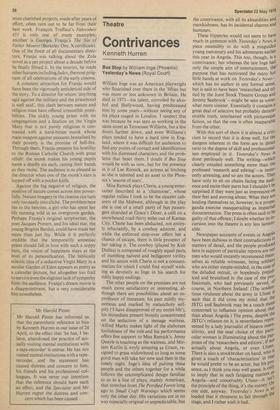Theatre
Contrivances
Kenneth Hurren Bus Stop by William Inge (Phoenix) Yesterday's News (Royal Court) William Inge was an American playwright who flourished over there in the 'fifties but was more or less unknown in Britain. He died in 1973—his talent, corroded by alcohol and Hollywood, having predeceased him by some years—without seeing any of his plays staged in London. I suspect this was because he was seen as working in the same street as Tennessee Williams, but a few doors further down, and even Williams's plays tended to have a hard time in England, where it was difficult for audiences to find any points of contact and identification with his distressed characters and the problems that beset them. I doubt if Bus Stop would be with us now, but for the presence in it of Lee Remick, an actress as fetching as she is talented and an asset to the Phoenix's 'season of stars'.
Miss Remick plays Cherie, a young entertainer described as a `chantoose', whose regular milieu I took to be the sleazier cabarets of the Midwest, although in the play she is one of a small party of bus passengers stranded at Grace's Diner, a café on a snowbound road thirty miles out of Kansas City. Cherie has been abducted, not entirely reluctantly, by a cowboy admirer, and while the enforced stop-over offers her a chance of escape, there is little prospect of her taking it. The cowboy (played by Keir Dullea) is composed of roughly equal parts of numbing naïveté and belligerent virility and his union with Cherie is not a consummation for which I could find myself wishing as devoutly as Inge in his search for tidily happy endings.
The other people on the premises are not much more satisfactory or interesting, although there are possibilities about an exprofessor of literature, his past mildly mysterious and marked by melancholy selfpity CI have disapproved of my entire life'), his immediate present boozily concentrated on the seduction of a teenage waitress. Alfred Marks makes light of the elaborate foolishness of the role and his performance offers fine support to Miss Remick's. Jenny Quayle is touching as the waitress, and Miriam Karlin is wryly amusing as Grace, resigned to grass widowhood so long as some good man will take her now and then in the lonely night. Inge's idea of putting these people and the others together for a while follows the uncomplicated design familiar to us in a line of plays, mainly American, that stretches from The Petrified Forest long ago to Small Craft Warnings which seems only the other day. His variations are in no way especially original or unpredictable, but
the contrivance, with all its absurdities and mawkishness, has its incidental charms and humours.
These fripperies would not seem to have much in common with Yesterday's News, a piece ostensibly to do with a misguided young mercenary and his adventures earlier this year in Angola. This too, though, is a contrivance; but whereas the late Inge had .1 only the simple aim of entertainment, thel purpose that has motivated the many hot little hands at work on Yesterday's News which has no author in any formal sense, but is said to have been 'researched and edited by the Joint Stock Theatre Group and Jeremy Seabrook'—might be seen as somewhat more sinister. Essentially it contains a great deal of selective but probably demon' strable truth, interleaved with picturesque fiction, so that the one is often inseparable from the other.
With this sort of show it is almost a criti' cism to record that it is done well, for the dangers inherent in the form are in direct ratio to the degree of skill and professional' ism employed in it. Yesterday's News is done perilously well. The writing—which clearly entailed something more than tile professed `research and editing'—is insistently arresting, and so are the actors. They have only to sit on chairs facing the wick' ence and recite their parts but I shouldn't be surprised if they were just as impressive on their feet and moving about. What they are lending themselves to, however, is a propaganda exercise masquerading as impartial documentation. The press is often said to he guilty of that offence; I doubt whether its incursion into the theatre is any less lament' able.
Newspaper accounts of events in Angola have been dubious in their contradictions it; matters of detail, and the people produce' here in support of particular reports are not men who would instantly recommend their selves as reliable witnesses, being soldicr! who are either simple-minded, in the case ot the deluded recruit, or hopelessly preind' iced and brutalised in the case of the pro; fessionals, who had previously served, ol course, in Northern Ireland. (The tendert' tious virulence about the army in Ulster is such that it did cross my mind that the JSTG and Seabrook may be a touch illcret concerned to influence opinion about dr than about Angola.) The press, despite tne JSTG's reliance on it, is nevertheless represented by a lady journalist of bizarre inset?' sitivity, and the neat choice of this Partle cular woman is illuminating about the Put; poses of the 'researchers and editors', if i'0 actually about Angola, or even Ulster.' There is also a stockbroker on hand, who Is given a touch of 'characterisation' in that he would prefer to be an actor, but his Pre: sence, as I think you may well guess, is onlY_ to imply that in such fatiguing matters ast Angola—and conceivably Ulster—it the principle of the thing, it's the money. uo one side, anyway. Yesterday's News is Ilse loaded that it threatens to fall through t stage, and I rather wish it had.


































 Previous page
Previous page